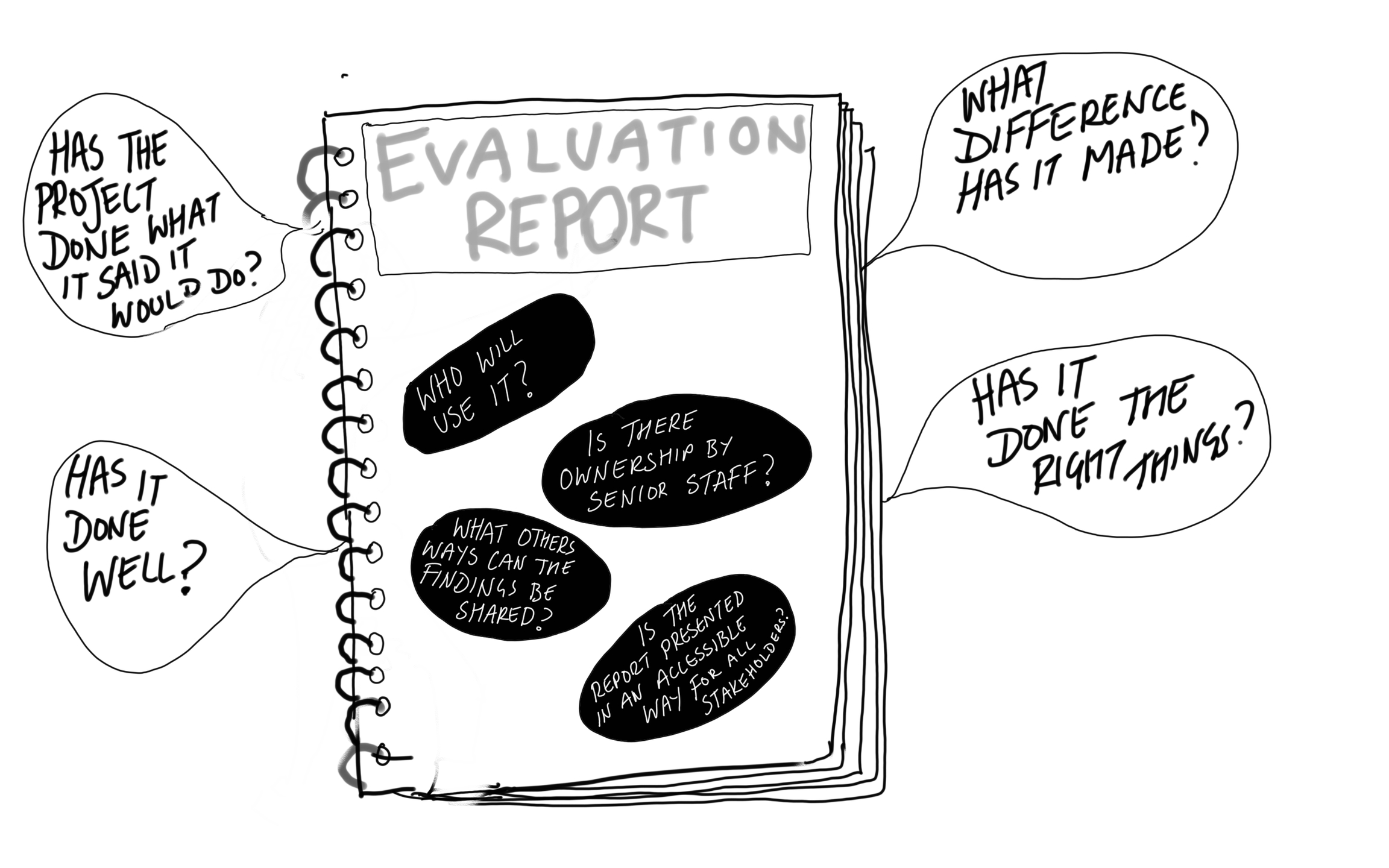Section 07: Evaluations
7.1: Introduction to Evaluations
An evaluation is the systematic assessment of the results (outcomes, impact) of an ongoing or completed project or programme at a specific point in time (usually mid- term and at project end). Often examining the efficiency, effectiveness, relevance, impact and sustainability of an intervention. Many organisations are expected to do evaluations for their donors which is why we have added this section to the tool kit.
There are many types of evaluations including: Process; Formative; Summative; Developmental; Real-time; Utilisation Focussed; Impact etc. In this section we will focus on exploring the stages and processes that need to be included in any evaluation chosen.
In the INTRAC M&E Universe, you will find a paper on evaluation in general, and one of types of evaluations, which includes links to short papers on each of the different types.
There is also other information available online about all of these – a useful website for this is Better Evaluation.
The UK Evaluation Society (UKES) has also developed useful guidelines for good practice in evaluation, including for evaluators, commissioners, self-evaluation and evaluation participants.
7.2: Stages in an evaluation
This section is aimed at helping NGO leaders to Manage an evaluation rather than do the evaluation themselves.
7.2.1: Agree purpose and scope
The first stage in any evaluation is to agree the purpose and scope of what is going to be evaluated which you will need to discuss with different stakeholders including donors, partners and project staff and be clear about who will be using the findings and make decisions based on the findings. The purpose may include: to improve the performance of a project or programme; to generate lessons for future programmes; o account for the resources that have been used and decide on a new phase; to inform policy decisions
7.2.2: Decide on type of evaluation
The second stage is to decide on the type of evaluation to complete - the links to different papers given in the introduction to this section will help you decide.
7.2.3: Identify who will be involved
The third stage is to identify who will be involved at which stage. For example, who decides the purpose of the evaluation and what type of evaluation will be used may be very different to who decides on how the analysis will be completed.
7.2.4: Developing terms of reference (TORs)
Stage four involves developing a terms of reference which includes an outline of the purpose, who will be involved, what will be evaluated and when the evaluation will take place.
You can download an editable sample ToR outline here.
7.2.5: Selecting the evaluation team
Stage five focuses on selecting the evaluation team who could be external MEL specialists, internal teams or a mixture of the two which can be more effective, particularly if working with different languages or cultural barriers.
7.2.6: Designing the evaluation
Stage six involves designing the evaluation based on the Terms of Reference and a review of project documents.
7.2.7: Developing a plan
Develop an evaluation plan which will include the evaluation team and the person identified by the organisation to manage the evaluation. Including:
Who will be interviewed or observed
How the evaluation will be conducted
What methodologies for data collection will be used
What process will be used to analyse the data
A report format and any other dissemination plans
A schedule of activities and a budget
7.2.8: Implementation
Stage eight is the implementation phase of the evaluation - collection of data using a range of quantitative and qualitative methods, the initial analysis of the data, identification of initial findings and recommendations and preparation of an initial draft report.
7.2.9: Presentation of initial findings
Stage nine is the presentation of the initial findings to a range of stakeholders in different ways. These could include a feedback and verification workshop with the participants who were involved in the evaluation, a learning workshop for the project staff and finally a report for the client or donors.
7.3. Good practice in evaluations
A good evaluation report needs to answer the four universal M&E questions:
Has the project done what it said it would do?
Has it done it well?
What difference has it made?
Has it done the right things?
Identify who will use the evaluation findings before you start.
Make sure senior managers are committed to the evaluation.
Design dissemination strategies that include more than a report.
Think about evaluation methods before collecting baseline data.
7.4 Questions to ask when managing evaluations
What is the purpose of the evaluation (and is everyone clear on this)?
Who has requested the evaluation?
What data should be gathered and how? Who should be involved?
Any key events to consider (staff availability, events, deadlines etc)
How will the results of the evaluation be used? (who will be responsible?)
7.5 Tips for Managers who manage evaluations
Have an Inception meeting with evaluators
Ask for an Inception Report
Have Regular engagement between the evaluation team and yourself during the evaluation
Have an organisation point of contact from the project/ organisation
Have an Evaluation Reference Group of key staff (and stakeholders) for key steps (Purpose, ToR, inception, key outputs)
Last updated
